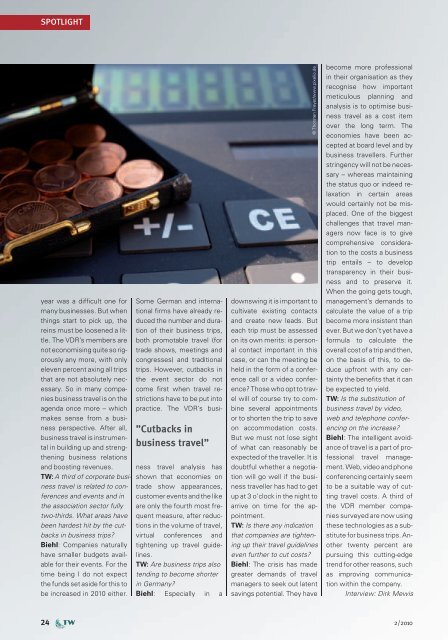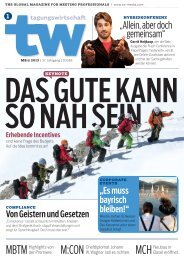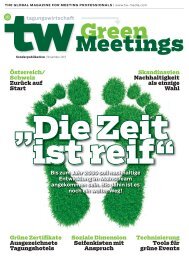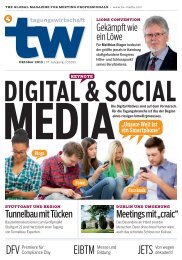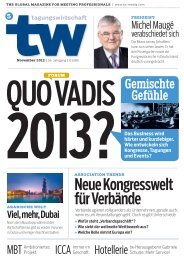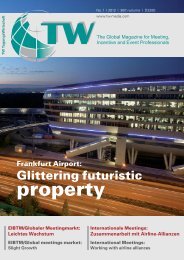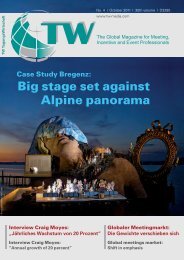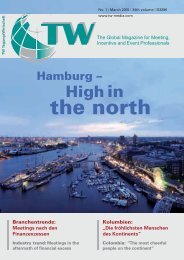financial excesses
financial excesses
financial excesses
- TAGS
- excesses
- www.tw-media.com
Erfolgreiche ePaper selbst erstellen
Machen Sie aus Ihren PDF Publikationen ein blätterbares Flipbook mit unserer einzigartigen Google optimierten e-Paper Software.
SPOTLIGHT<br />
year was a difficult one for<br />
many businesses. But when<br />
things start to pick up, the<br />
reins must be loosened a little.<br />
The VDR’s members are<br />
not economising quite so rigorously<br />
any more, with only<br />
eleven percent axing all trips<br />
that are not absolutely necessary.<br />
So in many companies<br />
business travel is on the<br />
agenda once more – which<br />
makes sense from a business<br />
perspective. After all,<br />
business travel is instrumental<br />
in building up and strengthening<br />
business relations<br />
and boosting revenues.<br />
TW: A third of corporate business<br />
travel is related to conferences<br />
and events and in<br />
the association sector fully<br />
two-thirds. What areas have<br />
been hardest hit by the cutbacks<br />
in business trips?<br />
Biehl: Companies naturally<br />
have smaller budgets available<br />
for their events. For the<br />
time being I do not expect<br />
the funds set aside for this to<br />
be increased in 2010 either.<br />
Some German and international<br />
firms have already reduced<br />
the number and duration<br />
of their business trips,<br />
both promotable travel (for<br />
trade shows, meetings and<br />
congresses) and traditional<br />
trips. However, cutbacks in<br />
the event sector do not<br />
come first when travel restrictions<br />
have to be put into<br />
practice. The VDR’s busi-<br />
”Cutbacks in<br />
business travel”<br />
ness travel analysis has<br />
shown that economies on<br />
trade show appearances,<br />
customer events and the like<br />
are only the fourth most frequent<br />
measure, after reductions<br />
in the volume of travel,<br />
virtual conferences and<br />
tightening up travel guidelines.<br />
TW: Are business trips also<br />
tending to become shorter<br />
in Germany?<br />
Biehl: Especially in a<br />
downswing it is important to<br />
cultivate existing contacts<br />
and create new leads. But<br />
each trip must be assessed<br />
on its own merits: is personal<br />
contact important in this<br />
case, or can the meeting be<br />
held in the form of a conference<br />
call or a video conference?<br />
Those who opt to travel<br />
will of course try to combine<br />
several appointments<br />
or to shorten the trip to save<br />
on accommodation costs.<br />
But we must not lose sight<br />
of what can reasonably be<br />
expected of the traveller. It is<br />
doubtful whether a negotiation<br />
will go well if the business<br />
traveller has had to get<br />
up at 3 o’clock in the night to<br />
arrive on time for the appointment.<br />
TW: Is there any indication<br />
that companies are tightening<br />
up their travel guidelines<br />
even further to cut costs?<br />
Biehl: The crisis has made<br />
greater demands of travel<br />
managers to seek out latent<br />
savings potential. They have<br />
become more professional<br />
in their organisation as they<br />
recognise how important<br />
meticulous planning and<br />
analysis is to optimise business<br />
travel as a cost item<br />
over the long term. The<br />
economies have been accepted<br />
at board level and by<br />
business travellers. Further<br />
stringency will not be necessary<br />
– whereas maintaining<br />
the status quo or indeed relaxation<br />
in certain areas<br />
would certainly not be misplaced.<br />
One of the biggest<br />
challenges that travel managers<br />
now face is to give<br />
comprehensive consideration<br />
to the costs a business<br />
trip entails – to develop<br />
transparency in their business<br />
and to preserve it.<br />
When the going gets tough,<br />
management’s demands to<br />
calculate the value of a trip<br />
become more insistent than<br />
ever. But we don’t yet have a<br />
formula to calculate the<br />
overall cost of a trip and then,<br />
on the basis of this, to deduce<br />
upfront with any certainty<br />
the benefits that it can<br />
be expected to yield.<br />
TW: Is the substitution of<br />
business travel by video,<br />
web and telephone conferencing<br />
on the increase?<br />
Biehl: The intelligent avoidance<br />
of travel is a part of professional<br />
travel management.<br />
Web, video and phone<br />
conferencing certainly seem<br />
to be a suitable way of cutting<br />
travel costs. A third of<br />
the VDR member companies<br />
surveyed are now using<br />
these technologies as a substitute<br />
for business trips. Another<br />
twenty percent are<br />
pursuing this cutting-edge<br />
trend for other reasons, such<br />
as improving communication<br />
within the company.<br />
Interview: Dirk Mewis<br />
24 2/2010<br />
© Thorsten Freyer/www.pixelio.de


